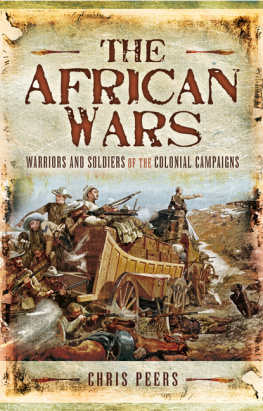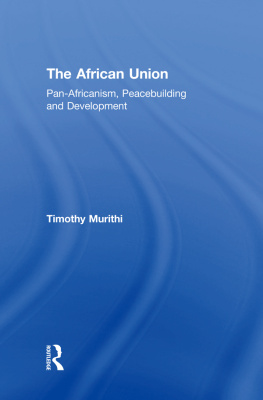Almanac of African
Peoples & Nations
First published 1999 by Transaction Publishers
Published 2017 by Routledge
2 Park Square, Milton Park, Abingdon, Oxon OX14 4RN
711 Third Avenue, New York, NY 10017
Routledge is an imprint of the Taylor and Francis Group, an informa business
Copright 1999 by Taylor & Francis
All rights reserved. No part of this book may be reprinted or reproduced or utilised in any form or by any electronic, mechanical, or other means, now known or hereafter invented, including photocopying and recording, or in any information storage or retrieval system, without permission in writing from the publishers.
Notice:
Product or corporate names may be trademarks or registered trademarks, and are used only for identification and explanation without intent to infringe.
Library of Congress Catalog Number: 98-54917
Library of Congress Catalog-in-Publication Data
Yakan, Mohamad Z.
Almanac of African peoples and nations / by Mohamad Z. Yakan.
p. cm.
Includes bibliographical references and index.
ISBN 1-56000-433-9 (alk. paper)
1. EthnologyAfrica. 2. LanguagesAfrica. I. Title.
DT15.Y35 1999
305.8'096dc21
98-54917
CIP
ISBN 13: 978-1-56000-433-2 (hbk)
Almanac of African Peoples and Nations is the culmination of phase one of an ongoing project that started in 1991. In the process of its development and completion many important references and other published works were utilized and/or consulted, the most helpful of which were: The New Encyclopaedia Britannica (Encyclopaedia Britannica, 1988); Encyclopedia of World Cultures, Africa and the Middle East (G.K. Hall, 1995); David H. Price's Atlas of World Cultures (Sage, 1990); miscellaneous publications by the Royal Anthropological Institute of Great Britain and Ireland; Basil Davidson's works on Africa's history and current Affairs, including Africa in History (Macmillan, 1974), The African Genius (Little, Brown & Company, 1969), and The Lost Cities of Africa (Little, Brown & Company, 1987); and Robert W. July's classic, A History of the African People (Charles Scribner's Sons, 1970 and 1974, and Waveland Press, Inc., 1998). Julys work was especially important not only as resourceful reference, but also as an exemplar of fine scholarship, sound analysis, and balanced and objective information on the history of the African peoples.
The Almanac of African Peoples and Nations represents the summation of eight years of extensive research, it could not have been led to a successful conclusion without the help of several of my graduate students at the United States International University (U.S.I.U.), notably Rachel Cook, David Threats, Octavio Ramirez, and Aliza D. Carpio; the invaluable comments and reviews of many colleagues, especially Professors Karl Magyar, Rolin G. Mainuddin, Paul J. Magnarella, F. Wafula Okumu, and Stephen Sylvester; the continued encouragement of Dr. Garry Hays, President of the U.S.I.U., Dr. Althia deGraf-Johnson, former VP for Academic Affairs, Dr. Ramona Kunard, Dean of Arts and Sciences, and former and present Chairs of the Department of Global Uberal Studies, Drs. Al Zolynas and Unda Swanson; and the patience and sustained support of my beloved wife, Sibylle Faye Nickel Yakan.
INTRODUCTION
Contrary to popular perceptions, the peoples of Africa constitute neither one nation nor a few nations. Like the peoples of other continents, those of Africa are neither ethnically nor religiously homogeneous. This is especially true within the territories of the political entities which since the 16th century have been subjected to a carving process by European colonial powers along European colonial interests with no regard to peoples' wishes, aspirations, and ethnic or religious ties.
The end result of the scramble for the African continent was a multitude of states, few of which could be described as nation-states with rational bonds that make up nations and distinguish one people from another. In fact, most African states are ethnically heterogenous, comprised of minorities with extensions in neighboring states. The civil wars that are currently being witnessed on the African continent are a function of European legacy in Africa.
It was not Africans who determined the boundaries of their respective states, nor did Africans determine the socio-economic composition of their respective societies. Both the boundaries and composition of African societies were determined by European powers to serve the particular economic and hegemonical interests of these powers. European decisions in this respect were implemented as if Africa was a terra nullius with no people, no societies, and no indigenous institutions. Hence, the boundaries and societal composition of African states are contrived phenomena imposed by Europeans. They are not natural phenomena. They are not a product of gradual, natural, historical processes or developments nor do they reflect the genuine aspirations of African peoples. Certainly, as long as the African status quo does not correspond to African realities in general, and the real wishes of the African peoples in particular, the continent will continue to suffer from socio-economic imbalances, if not chronic civil wars and tribal conflicts.
The path to stability on the African continent is through its people: their wishes and ultimate goals. It is not through forcing a status quo improvised by Europe which continues to serve as a means to perpetuate European zones of influence, interests, and prestige.
Helping Africa to reach a level of relative stability may require a Wilsonian remedy-a remedy that calls for the application of the principle of self-determination wherever and whenever a civil war occurs in the African continent. This remedy, may help the African people tailor their own destiny, rather than try to fit themselves into what has been created for them by foreign powers.
Additionally, the path to stability on the African continent is through federalism, whereby different ethnic and religious groups can live together in pluralistic societies where minority rights are duly observed, respected, and legally sanctioned.
In most African states, the unitary and highly centralized systems of government are replicas of colonial administrations, which were based on compulsion and force rather than on due processes of law. The driving interest of European powers was that of exploiting the natural and human resources of Africa. To this end, they utilized all sorts of devious and humanly dishonorable means.
The path to stability on the African continent is through the recognition of tribalism as a major, if not the major, political force in African states. Tribalism in Africa is what nationalism is in the countries of the First World. In fact, it is a stronger form of nationalism than what is experienced in a host of European states. It rests more on objective than subjective bonds. Moreover, it reflects Africa's genuine historical experiences and cultural heritages; it represents Africans' ideals, values, and aspirations; and it provides the basis for loyalties which, if properly utilized, can contribute to the development of African states. African tribalism is an indigenous rather than an alien ideology. Other things being equal, this ideology may be utilized to support the cause of development in Africa in a manner no different from kibbutzim in Israel or family-based businesses in Asian countries. Without recognizing the role of African tribalism and giving it its due regard and credit, and possibly utilizing it to support African development, of African states will continue to be alienated.




